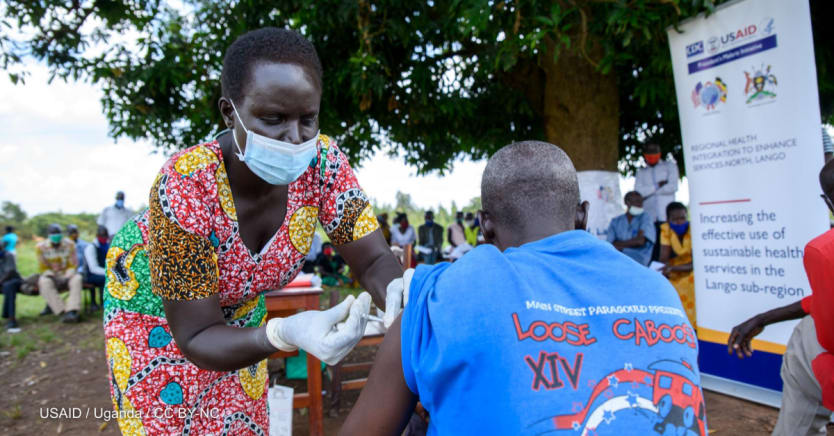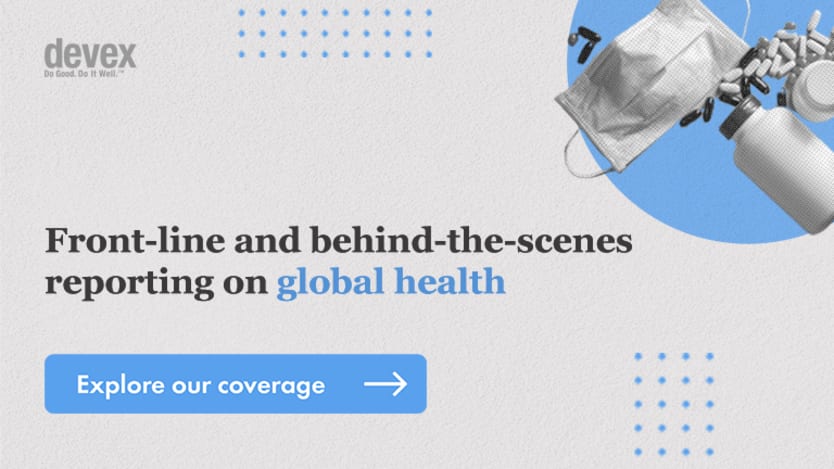
The Global Preparedness Monitoring Board, a high-level body set up to independently monitor the world’s preparedness for health crises, has urged member states of the World Health Organization to adopt an international agreement on health emergency preparedness and response and establish a process on next steps for negotiations in November.
Sign up for Devex CheckUp
The must-read weekly newsletter for exclusive global health news and insider insights.
The agreement “would put in place mechanisms to ensure that countries and stakeholders share information, data, and specimens, provide assurances that countermeasures will be developed, produced and allocated equitably, and commit to take collective responsibility for action,” a GPMB spokesperson told Devex in an email.
The spokesperson didn’t specifically mention a “pandemic treaty,” but the World Health Assembly agreed in May to hold a special three-day session from Nov. 29 to Dec. 1 to discuss the merits of developing “a WHO convention, agreement or other international instrument on pandemic preparedness and response.”
“Progress is slowed by geopolitical divisions, and negotiations are taking place behind closed doors without those they will affect the most.”
— Elhadj As Sy, chair, Global Preparedness Monitoring BoardWHO executive board should also agree to significantly increase WHO’s assessed contributions, and current negotiations to establish a financial intermediary fund — proposed by a G-20 high-level panel as a Global Health Threats Fund — "should conclude rapidly” and in consultation with stakeholders, such as governments, members of civil society, the private sector, and multilateral and implementing agencies, the GPMB has recommended.
WHO member states should also take stock of lessons from the review of the Access to COVID-19 Tools Accelerator, and establish a “permanent structure to support end-to-end development, production, procurement, and equitable access to medical countermeasures for health emergencies,” the board added in its latest annual report.
The board reiterated its call for the United Nations General Assembly to convene a summit at the level of heads of states and government on health emergency preparedness and response.
Winnie Byanyima: The world needs a COVID-19 plan
A unified, global plan is needed to tackle the COVID-19 pandemic, with buy-in from political leadership, said Winnie Byanyima, executive director at UNAIDS.
In addition, the board is advocating for various high-level discussions — such as at G-20; WHO’s working group on sustainable financing; and governance and financing discussions led by the United States and Norway — to also include broader country representatives, as well as members of civil society and the private sector.
Elhadj As Sy, chair of the board, said in the report that thousands of people continue to die every day, and yet “many talk and act as if the pandemic is over.” While solutions are being discussed, he said “ambition is waning.”
“Progress is slowed by geopolitical divisions, and negotiations are taking place behind closed doors without those they will affect the most,” he said in the report.
The board said it is building on its previous recommendations and the work of other bodies to spur action.
“Hundreds of expert recommendations have been made over the last two decades, new structures have been created, but the level of ambition and action has failed to match the global need. We know what to do. We just cannot seem to do it,” the report stated.









